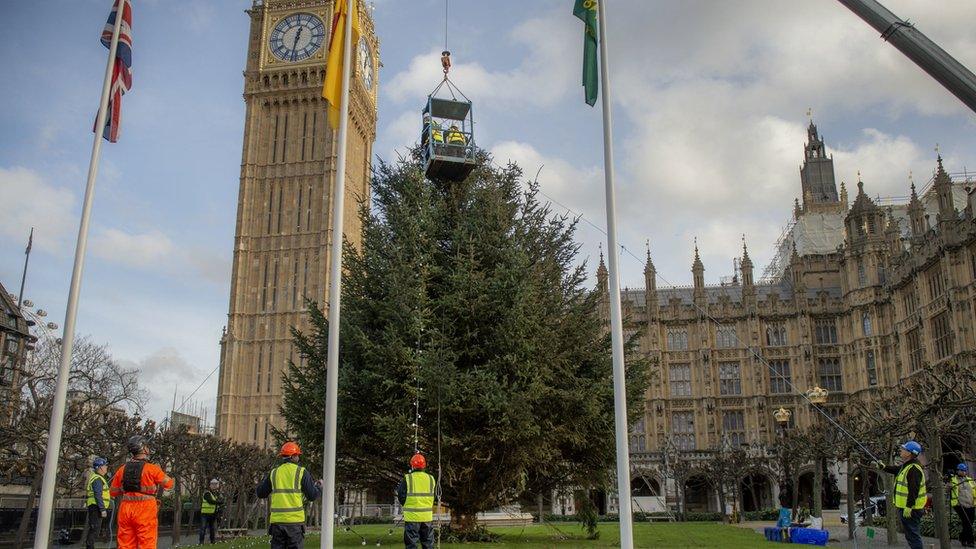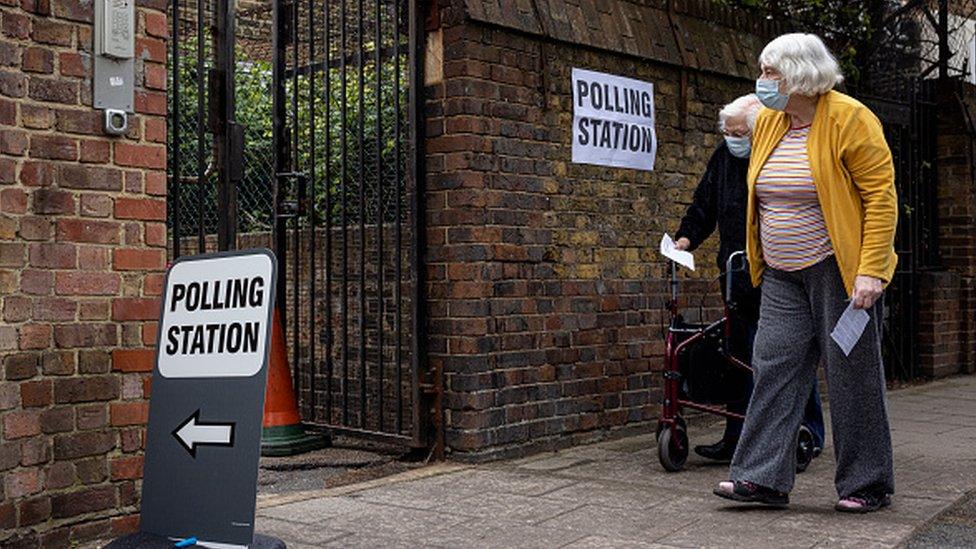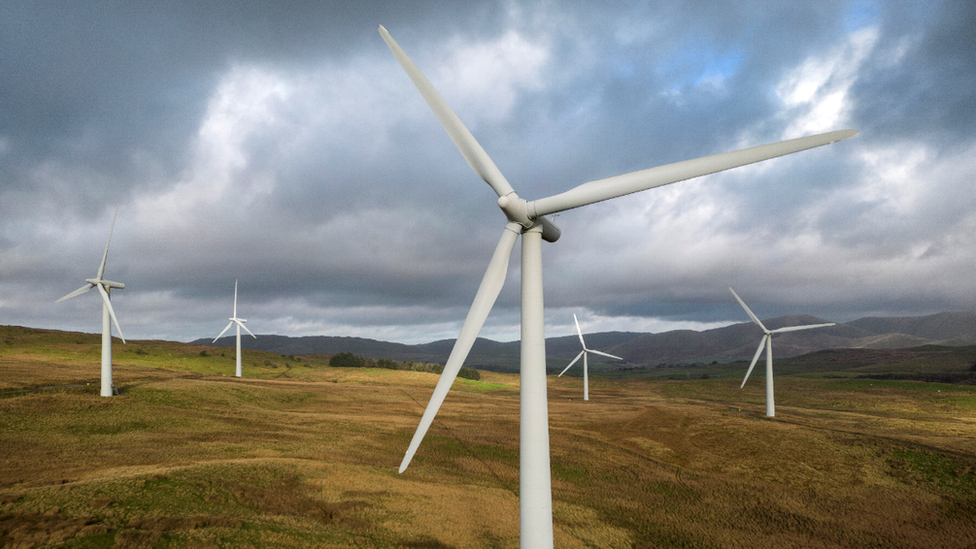What's happening in Parliament next week?
- Published

Parliament is not winding down to Christmas just yet. There's heavy-duty law-making, some important internal battles, and even a royal visit on the agenda for the coming week.
There is a growing backlog of major legislation that will still need much debate - and the parliamentary year is half done.
This includes:
The Online Safety Bill, which still has not cleared the Commons and will face extensive scrutiny and, doubtless, amendment in the Lords.
The massive Financial Services and Markets Bill
The Levelling Up Bill - great sprawling measures for their lordships to sink their teeth into.
There is so far no sign of the Transport Strikes (Minimum Service Levels) Bill, which has been waiting in the wings for quite a while. This would remove the trade unions' immunity from being sued for damages if they fail to maintain a minimum service during industrial action. And there's now talk of more legislation to limit strikes.
Monday 12 December
Commons: (14:30) Defence Questions start the week, plus the usual quota of post-weekend government statements and urgent questions.
The main debate will be the report and third reading of the Trade (Australia and New Zealand) Bill. Expect opposition MPs to have some fun with comments by former Environment Secretary George Eustice, that this was a poor deal for British agriculture.
Then watch out for the vote on the Voter Identification Regulations. These are very controversial changes to the ID requirements for voting; and there is likely to be a short but acrimonious debate.

The government says voter ID checks will prevent fraud, but critics argue the move could depress turnout
The opposition accuse the government of trying to suppress the turnout of young voters. MPs can not directly amend the regulations - they can either accept or reject them- but there may be an attempt to impose some kind of conditions around them. The same regulations are also due in the Lords on Tuesday.
Next MPs debate the Standards Committee recommendations for their new Code of Conduct.
The government wants to leave out a requirement, proposed by the committee, to bring the rules on declarations of interest for ministers into line with those for ordinary MPs. Standards Committee Chair Chris Bryant has an amendment to put that back in.
Westminster Hall: (16:30) Debates on a series of petitions around the state pension calling for: the pension age to be reduced back to 60 for men and women (another petition calls for it to be 63); an increase to £380 a week; an emergency £500 a year increase; support for the "triple lock" mechanism (currently suspended) which guarantees an increase in line with inflation, earnings or 2.5 per cent, whichever is greatest, or a minimum £200 a week guarantee for all pensioners,
Committees: Levelling Up, Housing and Communities (16:00) questions metro mayors Tracy Brabin (West Yorkshire), Andy Burnham (Greater Manchester), and Andy Street (West Midlands), on funding for levelling up. Followed by Welsh Government Economy Minister, Vaughan Gething.
Lords: (14:30) Two more new peers take their seats - Air Chief Marshal Sir Stuart Peach, a former chief of the defence staff, and Peter Hendy, the chair of Network Rail. Both will sit as crossbench or independent peers.
The main event is the first of two days of committee stage debate on the detail of the Genetic Technology (Precision Breeding) Bill, which would permit gene-editing to be used.
Tuesday 13 December
Commons: (11:30) Foreign Office questions start the day.
Then there is a ten minute rule bill from Labour's Zarah Sultana, to extend eligibility for free school meals.
The main debate is the postponed second day of the report Stage on the Levelling Up Bill - complete with government concessions on compulsory housing targets and onshore wind farms.

The government now says it will rewrite a planning rule restricting new turbines in England
There are a vast number of government amendments, as well as plenty of backbench offerings. Former cabinet minister Chris Grayling wants ecological surveys before planning applications. The Lib Dems' Helen Morgan has one on local housing standards and extending local bus services. The Green Party's Caroline Lucas has one on banning new coal mining developments. Labour spokesperson Lisa Nandy has a series of amendments around local control of planning and parliamentary scrutiny of new regulations.
Committees: Education (10:00) questions its former chair, now Skills Minister Robert Halfon, on T-Levels, Applied Generals, and apprenticeships.
Health and Social Care (10:00) hears from minister Maria Caulfield about concerns that pregnant women are still being prescribed the epilepsy drug, sodium valproate, despite its known risks as a cause of birth defects.
Lords: (14:30): David Prentis, Baron Prentis of Leeds, former General Secretary of UNISON, takes his seat as a Labour peer.
The the main debate is the Draft Voter Identification Regulations 2022, seen in the Commons. As I write the government and opposition are negotiating about the handling of the regulations, with Labour looking to put down a rider that there should be a report on the impact of the new rules on voter turnout in next year's local elections, with a promise of urgent action if it has fallen.
Peers have their last committee day on the Public Order Bill.
Wednesday 14 December
Both Houses will alter their normal timetables because of a visit to Parliament by the King.
Commons: (11:30) Northern Ireland Questions, followed by the last Prime Minister's Questions of 2022.
Then a ten minute rule bill from Conservative Jonathan Gullis, an attempt to ensure asylum seekers can be removed from the UK regardless of international treaties or other domestic law. The bill would also require the home secretary to ignore international court judgements against deportations.
The main debates are a general one on Ukraine, followed by a half-day debate on an SNP motion. Watch out for any change of approach from new SNP Westminster leader Stephen Flynn.
Westminster Hall: Conservative Paul Bristow leads a debate on the integrity of the voting process (11:00). which will be a de facto Commons second reading debate on the Ballot Secrecy Bill.
This is one for the cognoscenti - a Lords private members bill from the Conservative peer, Lord Hayward, aimed at curbing coercive "family voting" where family members accompany a voter - usually a woman or younger voter - into the polling booth to make sure they vote in a particular way.
Lords private members bills almost always disappear without trace in the Commons, but this one was speeded through a formal second reading on Friday 9 December, after a cross-party deal. It is now ready to enter its committee stage and will probably become law. It's the second recent example of the government getting creative with favoured private members bills.
Committees: Home Affairs (09:45) quizzes Metropolitan Police Commissioner Sir Mark Rowley on police standards, after a series of high-profile failings in police conduct. He will also answer questions on the Met's performance on fighting crime, and policing protests.
Lords: (13:00) Peers polish off their committee consideration of the Genetic Technology (Precision Breeding) Bill.
Thursday 15 December
Commons: (09:30) International Trade Questions. Then the main main debate, a backbench motion on "self-disconnection" of pre-payment meters. This is where pre-payment meters automatically cut out, leaving customers without the level of protection given to those on regular meters when they run into financial trouble.
That is followed by a general debate on services on the West Coast Main Line.
Committees: Public Accounts (10:00) has its annual hearing on the Defence Equipment Plan - the 10-year rolling programme of procuring and building defence kit and systems. Is it delivering and is it sustainable?
Lords (11:00) Debates chosen by backbench Liberal Democrat peers. The first is on Official Development Assistance staff shortages, and support for public sector workers in the NHS and social care. The second is on the regional distribution of Arts Council England Funding.
Friday 16 December
The Commons is not sitting, but the Lords is in action. From 10:00 peers will debate a series of select committee reports, starting with the Communications and Digital Committee's report on BBC future funding.
Then comes the Public Services Committee report on re-thinking the public services workforce.
Finally peers will debate the Constitution Committee report on revision of the Cabinet Manual.
